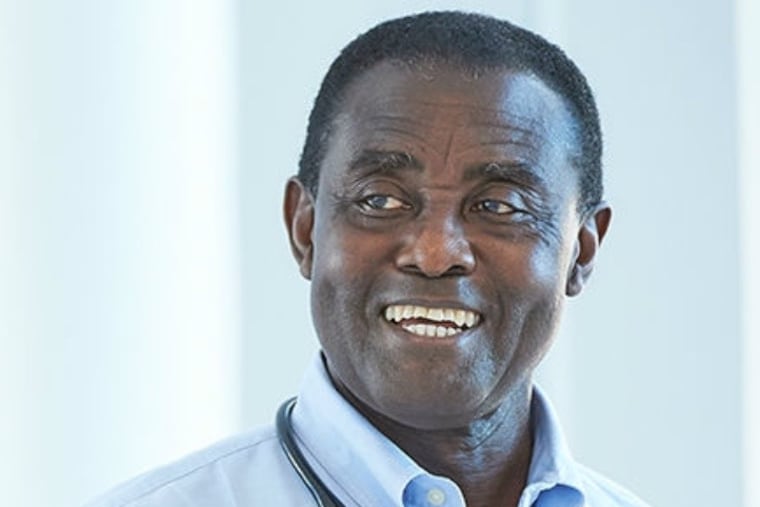Kwaku Ohene-Frempong, world-renowned expert on sickle cell disease, director emeritus at CHOP, and professor emeritus at Penn, has died at 76
He pioneered the testing for and treatment of sickle cell disease around the world and developed the first public health program for screening newborns in Africa.

Kwaku Ohene-Frempong, 76, of Elkins Park, a world-renowned expert on sickle cell disease, director emeritus of the Comprehensive Sickle Cell Center at Children’s Hospital of Philadelphia, professor emeritus of pediatrics at the Perelman School of Medicine at the University of Pennsylvania, and a founder and president of the Sickle Cell Foundation of Ghana, died Saturday, May 7, of metastatic lung cancer at Penn Hospice at Rittenhouse.
Dr. Frempong became interested in pediatrics early in his career and focused on sickle cell disease — a painful genetic disorder that affects red blood cells — in 1972 when his infant son, Kwame, was diagnosed with the illness. Encouraged by his mother and inspired by his son and wife, he went on to develop, advocate, and oversee routine newborn screening programs for sickle cell and establish many of the current treatment practices now used around the world.
Adept as an administrative leader and transformative as a researcher and clinician, Dr. Frempong was, among other things, a founding member of the Global Sickle Cell Disease Network, national coordinator for the American Society of Hematology Consortium on Newborn Screening in Africa, and chief medical officer, board of directors chairman, and board member emeritus of the Sickle Cell Disease Association of America.
He wrote many articles, obtained several research grants, and received countless awards, including the Order of the Volta in 2010 for outstanding service to Ghana. In 2020, he became the first nonmilitary American recipient of the Assistant Secretary for Health Exceptional Service Medal, and he received the 2021 Henry M. Stratton Award for Translational and Clinical Science from the American Society of Hematology.
Officials at the Sickle Cell Disease Association of America said Dr. Frempong was a “true leader in the sickle cell community,” and colleagues at CHOP called him “a visionary” with an “unwavering commitment to his patients and families both near and far.”
A star soccer player, hurdler, and sprinter in college, Dr. Frempong was inducted into the Rhode Island-based International Scholar Athlete Hall of Fame in 1999. But, in a 2008 PRX podcast, Chasing the Crescent Moon: The Story of Dr. Frempong and Sickle Cell Disease, he said he avoided talking about his many athletic achievements. “If [people] are going to see me as a role model,” he said, “I want them to do it as doctor, something that they can become.”
Later in the podcast, a young patient in Philadelphia said Dr. Frempong was like a second father to her. “He’s just real sweet and caring,” she said. “He became more than just my doctor.”
Born Wednesday, March 13, 1946, in Kukurantumi, Ghana, Dr. Frempong was an exceptional student and track star as a young man. He went to secondary school at the prestigious Prempeh College in Kumasi, Ghana, and graduated in 1966 as the national high school champion in the high hurdles, long jump, and triple jump.
He attended Yale University through the African Scholarship Program of the American Universities, earned a bachelor’s degree in biology in 1970, and, running track and playing soccer, won the William Mallory Award as the best scholar athlete at Yale. He skipped competing for Ghana in the 1968 Summer Olympics to concentrate on his studies but was named most outstanding athlete at the 1969 Ivy League indoor track championships.
Dr. Frempong met Janet Williams in 1969 when she was a student at Cornell University. They married in 1970 and had son Kwame and daughter Afia. His son died in 2013 from complications of sickle cell.
He graduated from the Yale School of Medicine in 1975, trained in pediatrics in New York and then in pediatric hematology-oncology at CHOP. He spent six years on the faculty at Tulane University School of Medicine, established sickle cell treatment centers in Louisiana, and advised the state’s department of health on newborn screening programs.
He returned to CHOP in 1986, directed the Comprehensive Sickle Cell Center from 1990 to 2010, and initiated several global groundbreaking research and public health projects. He attained full professorship at Penn in 1996 and retired from CHOP in 2016 to focus on his programs in Ghana and around the world.
Dr. Frempong was inspirational and a mentor, friends and colleagues said. He liked to watch soccer and was interested in music, cocoa farming, art, history, religion, and astronomy. “He was an incredible family man,” his wife said. “He cared about his fellow human beings and treated everybody with respect and kindness.”
In addition to his wife and daughter, Dr. Frempong is survived by two grandchildren, three brothers, one sister, and other relatives. Two sisters and a brother died earlier.
A memorial service is to be held later.